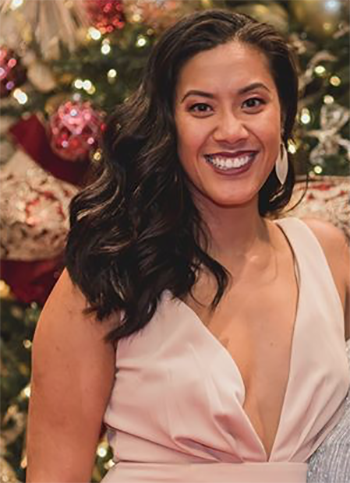Tina Meetran ’15, M.A. ’16, majored in international development and social change at Clark with a concentration in migration and cultures. She earned her master’s in community development and planning through Clark’s International Development, Community, and Environment Department. She has parlayed her Clark experience to a career with a nonprofit that helps first-generation and low-income students realize their college dreams.
 We caught up with Meetran to find out how the pandemic has affected her life and work.
We caught up with Meetran to find out how the pandemic has affected her life and work.
Where are you now? What have you been up to?
After graduating from Clark with my master’s degree, I moved back home to work at a nonprofit organization, College Visions, that helped me through my college enrollment and degree attainment journey.
College Visions is a small nonprofit located in Providence, R. I., and works with first-generation and low-income students to help them apply to and graduate from college. We do this by providing one-on-one advising to our students and providing them access to resources that they may not normally receive due to different barriers, where financial barriers are a big one.

After approximately four years of working here, I am currently Acting Co-Director of College Visions, alongside my colleague, Moira Hinderer. The thing that makes College Visions special is that we are not focused on just checking the academic boxes. We invest in our students — we focus on providing social-emotional support to empower them in their academic, as well as their personal, growth. We believe that every student deserves access to higher education.
Despite the different barriers and social prejudices that our students may face in their daily lives, we remind them that college is for them more than it is for anyone else. We remind them that their voices are meant to be heard, that their perspectives are valuable, and that they belong. One of my proudest contributions is creating a guide for counselors, advisers, educators, and community members to advise undocumented students in college access. The guide shines a light on the additional barriers that undocumented students face when planning their academic and professional futures and also informs people of best practices in supporting undocumented students through this process.
How specifically has the pandemic affected you (your work, your daily life, your family, friends, etc.)?
As with most people, I am now working from home, something I’ve rarely done before. I live with my mother and my sister, so at times working from home does get very difficult and starts to feel suffocating — because personal responsibilities, family responsibilities, and work responsibilities all exist within the same space, and those lines become blurred.
I would like to take time to shine a light on immigrant families and families that have non-English-speaking parents. My mother isn’t currently working and she relies on my sister and me to translate her medical forms, interpret during her doctor appointments, and ensure she has everything set to return to work at the right time. Our workdays frequently get disrupted because of our mother’s needs — needs that we are happy to help her take care of!
It’s no one’s fault, but these personal responsibilities are an added challenge to being productive in my work. It’s stressful to balance all of that at all hours of the day. And not only my workload has increased; this pandemic has increased my anxiety and stress. And it doesn’t help that I’m not able to be physically present with my friends during this time. However, I am grateful to still have a job. I am grateful to be able to work from home. And grateful that my family has everything they need to be comfortable. My heart goes out to frontline workers, essential workers, undocumented families, and families in need. This pandemic is impacting them the most, and I hope they are getting all the support they need to get through this.
How have you been dealing with life during the pandemic?
Honestly, I’m taking it day by day. Again, my anxiety and stress levels are very up and down nowadays. I am thankful to be with my mother and sister and to have their company. We try to get outside as much as possible and take walks with each other when the sun is out and the weather is warm.
It’s also great to have my sister as a workout motivator, so we’re able to stay active after a long day of sitting and working. Staying connected with friends and family has also been crucial during the time for myself and for everyone. It’s important to remind ourselves that we may be physically isolated but we still have many people supporting us and there for us.
How have you seen people in your area react to the pandemic?
Working with young people and students, the most prominent effects have been related to financial stress and mental health. Being a person of color who grew up in a low-income household, and a daughter of immigrants myself, I can relate strongly to the students we work with.
During this pandemic, our students find themselves balancing school work and home responsibilities at all hours of the day. Sometimes they have to go to work during school hours because their employers aren’t respecting that time boundary. Students’ families are left wondering how they will make it through the next month because they have no income coming in. Students were forced to go home to environments that aren’t ideal for learning and that may also be detrimental to their mental health.
Are you doing anything that takes your mind off things (hobbies, movies, books, etc.)?
During this time, I have reconnected back with my art, which has been a beautiful thing. I was reminded of how much art really is a healing tool for me, and it grounds me in staying center and present. I can paint for hours, being at peace with myself and breathing through the unsettling feelings I may feel. I am slowly practicing doing small artistic things every day and reassuring myself that the small practices will lead to bigger actions.
How have you chosen to give back or help during this time?
My 9-to-5 job is centered in the community and works with the community. People we work with often don’t have the resources to get through times like this, so we’ve been able to support our low-income families, immigrant families, and undocumented families with financial needs and tech needs. We have been able to guide students through online learning and through their emotional responses to this new climate. It’s been amazing to know that we have this capacity to be there for our community and support them in any way that we can.
Even beyond that, I know my purpose is to empower and support young people to grow into leaders in their own lives. I’ve been in conversations with different nonprofit organizations in Providence to continue talking about and planning how we can be a strong support system for young people.
